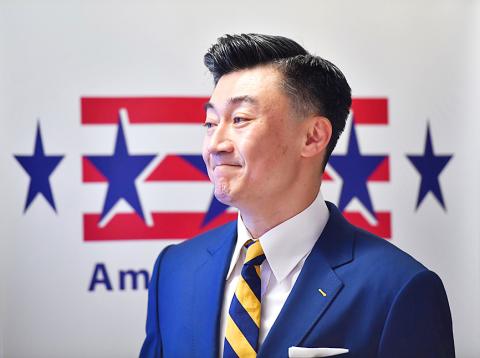Most US companies in Taiwan are optimistic about the nation’s economy this year and beyond, saying the COVID-19 outbreak would not affect firms in the manufacturing industry and the effect on the service sector would likely be short-lived, the American Chamber of Commerce in Taipei (AmCham) said yesterday.
About 60 percent of respondents in a survey of AmCham members expressed confidence in Taiwan’s economic growth in the next 12 months, a sharp increase from 46 percent last year.
“The level of confidence would likely have been higher, if not for the coronavirus outbreak that erupted during the survey period” from January to Feb. 17, AmCham chairman C.W. Chin (金奇偉) said.

Photo: CNA
While a phase 1 trade deal between the US and China helped lift sentiment, Taiwan’s progress on energy and labor policies, as well as its regulatory framework, also lent support, Chin said.
The chamber is the most influential international business organization in Taiwan, with about 1,000 members from more than 500 companies in the global business community.
Member firms expressed satisfaction about how the government is coping with COVID-19, which has infected 42 people in Taiwan — less than in Japan, Hong Kong, Singapore and South Korea, Chin said.
However, COVID-19 has dented revenue growth expectations, with 77.67 percent of respondents expecting an increase in the next 12 months, down from 80.45 percent last year, the survey found, adding that the confidence level was higher, at 86.6 percent, prior to the epidemic.
Manufacturing member firms in Taiwan have maintained normal operations, but tourism-oriented firms, such as hotels and airlines, were taking a hit, Chin said.
“Hopefully, the impact will prove short-lived once the virus is contained,” he said.
The chamber welcomed Taiwanese manufacturers moving production to the nation from China, the survey said, adding that 10.75 percent of members plan to do the same.
Of the respondents, 35 percent expect to increase their staff numbers in Taiwan this year, the group said, citing innovation and market expansion as the main sources of growth.
Cross-strait relations, energy, labor policies and trade ties with the US continue to top the list of concerns among US firms, although they were less worried about the issues than last year, Chin said.
US companies hope to see sufficient power supply and voltage stability, without steep hikes in the price of electricity, as the government seeks to phase out nuclear power by 2025, he said.
Respondents also believe that more flexibility is needed regarding regulations on working hours and overtime pay to meet the needs of a knowledge-based economy, Chin said.

In Italy’s storied gold-making hubs, jewelers are reworking their designs to trim gold content as they race to blunt the effect of record prices and appeal to shoppers watching their budgets. Gold prices hit a record high on Thursday, surging near US$5,600 an ounce, more than double a year ago as geopolitical concerns and jitters over trade pushed investors toward the safe-haven asset. The rally is putting undue pressure on small artisans as they face mounting demands from customers, including international brands, to produce cheaper items, from signature pieces to wedding rings, according to interviews with four independent jewelers in Italy’s main

Japanese Prime Minister Sanae Takaichi has talked up the benefits of a weaker yen in a campaign speech, adopting a tone at odds with her finance ministry, which has refused to rule out any options to counter excessive foreign exchange volatility. Takaichi later softened her stance, saying she did not have a preference for the yen’s direction. “People say the weak yen is bad right now, but for export industries, it’s a major opportunity,” Takaichi said on Saturday at a rally for Liberal Democratic Party candidate Daishiro Yamagiwa in Kanagawa Prefecture ahead of a snap election on Sunday. “Whether it’s selling food or

CONCERNS: Tech companies investing in AI businesses that purchase their products have raised questions among investors that they are artificially propping up demand Nvidia Corp chief executive officer Jensen Huang (黃仁勳) on Saturday said that the company would be participating in OpenAI’s latest funding round, describing it as potentially “the largest investment we’ve ever made.” “We will invest a great deal of money,” Huang told reporters while visiting Taipei. “I believe in OpenAI. The work that they do is incredible. They’re one of the most consequential companies of our time.” Huang did not say exactly how much Nvidia might contribute, but described the investment as “huge.” “Let Sam announce how much he’s going to raise — it’s for him to decide,” Huang said, referring to OpenAI

Nvidia Corp’s negotiations to invest as much as US$100 billion in OpenAI have broken down, the Wall Street Journal (WSJ) reported, exposing a potential rift between two of the most powerful companies in the artificial intelligence (AI) industry. The discussions stalled after some inside Nvidia expressed concerns about the transaction, the WSJ reported, citing unidentified people familiar with the deliberations. OpenAI makes the popular chatbot ChatGPT, while Nvidia dominates the market for AI processors that help develop such software. The companies announced the agreement in September last year, saying at the time that they had signed a letter of intent for a strategic